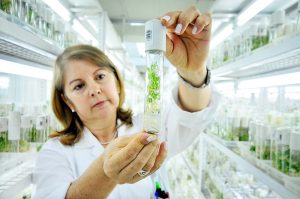 Genetic modification is nothing new. Some might call it miraculous.
Genetic modification is nothing new. Some might call it miraculous.
The practice started a few thousand years before the birth of Christ. If a farmer grew corn, he would plant seeds from the hardiest plants that produce the most. If a herder wanted to improve his flock, he would breed the strongest ram with the fattest ewe to produce better lambs.
Of course, things got more sophisticated in the past several decades. The first genetically modified plants appeared in the 1980s. We got better corn, cheese, potatoes and cotton. In the past couple years, we got modified animals approved for consumption, notably faster-growing salmon.
These improvements come from scientists in laboratories, a clan with admirable determination to make the world a better place. And who could argue with longer-lasting tomatoes, fluffier rice or sterile mosquitos?
But what about human beings? What if scientists could modify human genes and make better people?
That has a certain appeal. Humans aren’t perfect. My lower back has a slipped disk that must be the result of poor design. My sinuses are prone to infection. It wouldn’t hurt to have a few more points on my IQ score. Maybe those are things genetic engineering could address. But I doubt it is possible to re-engineer me at the relatively advanced stage of my life.
For future generations, scientists have improvement plans. Really smart researchers in Portland, Oregon have created genetically modified embryos. They didn’t let them grow for long, just enough to prove that their genetic editing had been successful. Then they killed them. This raises some moral issues in my mind.
First, there is the issues of creating life in a lab, then destroying it. My reading of the catechism suggests there are at least two wrongs here and they will never yield a right.
Second, there is the potential application of the law of unintended consequences. By fixing one problem, science might create another. Maybe engineering people to be smarter would make them arrogant, selfish and less appreciative of God’s gifts.
Third – and speaking of God – as trite as it sounds, are we playing God by playing with the very building blocks of humanity? Past efforts to build a better man have yielded sad results.
A century ago, the eugenics movement to improve the human race produced racism, sterilizations and abortions.
Nazi efforts at genetic/racial purification produced the genocide of “lesser” races, millions of deaths, torture, hideous experiments and the “great war.”
Such horrors could never happen today. We’re so more advanced, so smarter, more sophisticated, more enlightened. Perhaps. But are we any wiser? We may simply have greater means to create a horror we can’t predict.
